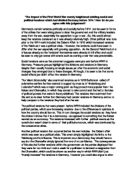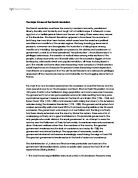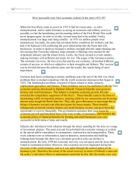Compare the characters and beliefs of Lenin and Stalin.
HISTORY COURSEWORK ASSIGNMENT A: : Compare the characters and beliefs of Lenin and Stalin. Both Lenin and Stalin had similar characters, they were very ambitious in terms of politician as they always aimed to achive more and more, they would do everything what´s in their power to be much more powerful than they were already, this power would give them pore strengh within their posts. This ambition could be determined. Along their lives they had always someone hanging around them to take advantage of any possible opportunity to get nearer and nearer of becoming their most dilligent and efficient workers. Lenin and Stalin had colleagues and followers rather than friends. A clear example which justifies this fact is that Stalin itself was always beside Lenin in order to become his successor. We can argue that both of them gave entirely to politics no matter for what they were fighting for, if it was beneficial or not to Russia, but at the same time it is to say that if someone who suggested their capability or qualities as a leader they would have serious problems. Overall they were both very humourless. Evidence which proves my idea is that almost everyone did whay ever they wanted them to do, their supporters were committed to do what both Lenin and Stalin told them to do, if they didn´t obey their orders they could be involved in serious problems with them. Not only they
The enormous role that Trotsky played in the success of the Bolsheviks up until Lenin's death in 1922 - source related study
(A) The enormous role that Trotsky played in the success of the Bolsheviks up until Lenin's death in 1922 has often been diminished due to the events that proceeded 1922. However it has been suggested often that whilst Lenin was the visionary of the Bolsheviks, Trotsky was the practitioner. This is most evident in his contribution in the lead up to and during the Russian civil war, upon which the ultimate success of the Bolsheviks was due to. Leon Trotsky had joined the Bolsheviks slightly more belatedly than other members of the party. During his time in London in the early nineteen hundreds, Trotsky's firm belief in Karl Marx led him to his ideology of a permanent Revolution. This meant that at first he was opposed to Lenin, the leader of the Bolsheviks, and his later close friend and confident. It was because of this early disagreement that he instead joined the rival party, the Mensheviks. When Lenin called for the seizure of power by the working class instead of a small and elite group of learned bourgeois's in 1917, many faithful Bolsheviks were shocked that Lenin had abandoned the orthodox ideology of the Bolsheviks. He now favoured a new one that was practically identical to Trotsky's permanent revolution. After this it was only a matter of time before inevitably, Trotsky became a Bolshevik. The first significant event in the Bolshevik takeover, was undoubtedly the
The Battle of Britain
The Battle of Britain The Build up to The Battle of Britain By the August of 1932, the National Socialist German Workers' Party, had massed over 400,000 members, and it was not uncommon for Hitler to give speeches to audiences of in excess of 100,000. Hitler promised that he would take Germany out of the great depression it was in, he promised employment, an increase in manufacturing, and above all, he promised that Germany would once again be a world power. By 1933, the Nazi party constructed the first concentration camp at Oranienburg just outside Berlin. He attained total power by bypassing the Enabling Act allowing to the Nazi Party to rule by decree and thus the democratic system was abolished with the Nazis having complete power, and the Third Reich was born. Most of the following years until 1937 were spent on domestic issues within Germany. By 1935, all German Jews had to give up their rights of citizenship. They were also forbidden to marry, and it was illegal for them to have any form of sexual relationship with people of German heritage that had blonde hair and blue eyes, who were acknowledged by Hitler as being part of a super race (Aryans). Jewish shops and businesses were outlawed, and in the years to follow the Jews were made a mockery of by the painting of slogans on the walls of Jewish homes and places of business. The rallies and speeches continued from
Explain the role of Czechoslovakia in the appeasement story.
Explain the role of Czechoslovakia in the appeasement story Czechoslovakia was the best example of appeasement in action. But the origins of the crisis are routed back during World War One: Towards the end of World War One after the Austrian empire had collapsed. It was clear that out of central Europe several new states would be formed. This was because in Wilson's Fourteen Points he had stressed the importance of self-determination in point 10. Wilson wanted to re-draw the frontiers of Eastern Europe so that races ruled themselves. This was confirmed by the Treaty of Versailles which formed the new states of Finland, Poland, the Baltic States (Estonia, Lithuania and Latvia), Austria, Hungary, Yugoslavia. Thus Germany, Austria-Hungary, Bulgaria, and Ottoman Empire all lost territory. In all, nine nation states were set up including Czechoslovakia which was formed because quite a few Czechs and Slovaks wanted a country of their own. Thomas Masaryk was undoubtedly the father of the new state he was great campaigner from the independence of the Slavic peoples from Austria-Hungry. When the First World War broke out he had to flee the country to avoid being arrested for treason, going to Geneva, Italy, and then London, where he continued to agitate for Czech independence. In 1917 he went to Russia to help organize Slavic resistance to the Austrians. In 1918 he went to the
To what extent was equality achieved under Stalin?
To what extent was equality achieved in the Soviet Union under Stalin? ("Comrade, come join the Kolkhoz!") Hannah Dalgleish Hawick High School Contents Introduction p 3 National Minorities and Equality p 5 Rural Equality and Collectivisation p 7 Industrialisation and the Equality of the Proletariat p 10 The Purges: Stalin's equaliser p 14 Equality: Gender and Personal Expression p 17 Conclusion p 20 Bibliography p 22 Total Word Count: 3999 Introduction For a truly equal state to exist, the "utopian dream of community through equality, sharing, and fairness in income and privilege"1 would have to be set in place. The nation's population would have to be equal regardless of ethnicity, background, gender, or religion. Society would be classless, and everyone would have an equal opportunity to education and work. Karl Marx believed that equality could be achieved through a series of revolutions in the Western capitalist states, essentially creating a great Communist nation.2 He would have never expected that Russia would attempt to be the first country to adopt communism - largely due to its relatively backward industrial position in his lifetime. After the Bolshevik Revolution of October 1917, Lenin laid the foundations that would lead Russia towards communism. However, under Stalin, the hope that Russia would become the
Why was the league so ineffective in dealing with the Abyssinian Crisis?
Why was the league so ineffective in dealing with the Abyssinian Crisis? Although both Italy and Abyssinia were supposed to do as the league told them to do, if Italy didn't agree with the leagues decision then they weren't going to listen to it as the Italian leader Mussolini was quite prepared to go to war with Abyssinia. The question that the league had to take was what to do with Italy if they took this action. The problem that the league had was that the action they took depended on the actions of the French and the British who were the two great powers in the league and they wanted Italy as a future ally against Germany so they didn't want to be too harsh with Italy in case they then wouldn't help against Germany. In January 1935, the French foreign minister, Laval, met with Mussolini in Rome for a number of secret meetings. In these secret meetings they made some secret agreement some of these involved Abyssinia and yet Abyssinia wasn't even there so one of the major powers was making secret agreements with the country that is almost certainly ready to go to war. The whole idea of the league was to stop aggressors and yet here they were trying to come to some sort of deal with them. Because of these meetings Mussolini thought that both Britain and France wouldn't object at Italy gaining another African colony of its own as both Britain and France had colonies of
Russian Revolution Sources Questions
Russian Revolution Sources Questions . Study source A. What can you learn from Source A about Lenin's opinion of Trotsky and Stalin? Source A is an extract from Lenin's Political Testament written on 25th December 1922. You can learn from Source A that Lenin believes Stalin 'Has concentrated enormous power in his hands and I'm not sure that he always knows how to use that power with sufficient caution. Lenin's opinion of Trotsky is that 'He is the most able man in the party. His defect is self-confidence. He is attracted too much by purely administrative aspect of affairs'. Lenin's testament was basically a critical appraisal of who he felt were the most able candidates to take over the leadership of the communist party after his death. In the testament Lenin weighs up the pros and cons of the most able men, Josef Stalin and Leon Trotsky. Lenin is hinting at the fact Stalin is too power hungry but does not know how to use this party wisely. Whereas it seems clear where Lenin's beliefs lie, with Trotsky. He seems convinced Trotsky is the more able man of the two but has too much self confidence and is more interested in the public and business affairs, however, he has great ability. Lenin is warning against a split in his testament, he is afraid of the choice of his successor and has sent he has seen the warning signs clearly and this is perhaps the purpose of Lenin
To What Extent did Commandos contribute to final victory in World War Two
To what extent did Commando forces fulfil their aims and contribute to final victory in World War Two? Commandos are often seen as super soldiers, part of a highly trained elite, who are highly effective in what they do. While this may be true of today's Royal Marine Commandos, it is debatable whether the founding Commandos were as effective as propaganda portrays them. Norman Davies and Ronald Atkins both dismiss the idea of Commandos doing any serious damage against the German war machine. Davies argues that "Great play is made in British war mythology of the numerous special service units - the Special Operations Executive, Royal Marines Commandos, parachutists... Yet in the overall wartime scene their activities were extremely marginal - outward evidence of the basic fact that the British Army was incapable of challenging the enemy on an equal footing."1 Atkins agrees with this idea arguing "Most [Commando raids] were no more than pin - pricks, and some proved embarrassing duds". However he concedes that they "sustained British morale in those grim days" and "they were testimony to Churchill's eagerness to attack, even at the most depressing of times, and helped to sustain the British people's determination."2 He also argues that the Commandos (especially the St Nazaire raid which he agrees was "Spectacularly successful") encouraged Churchill's "desire for further
Trotsky - Succession, Revolutionary Success, Civil War Hero, Death, Failure and End
Did Trotsky deserve to succeed Lenin? It is a common view amongst the uninitiated that Stalin was a relatively unknown and insignificant figure in Russian history until Lenin's death in January 1924. Trotsky, Lenin's brilliant accomplice and civil war hero, seemed to be the natural replacement for Lenin. It therefore comes as a surprise to many that Stalin managed to outmanoeuvre the 'vastly more talented and deserving Trotsky'1 to become Lenin's successor. However, it is on this issue of Trotsky being the more "deserving" of becoming the supreme power in Russia that much controversy surrounds. Despite the fact that 'no one else in the leadership came anywhere near him as a public speaker'2 and that he clearly 'excelled as a commentator, a critic, an orator, an executor of politics and was the ideal complement to Lenin'3, by 1929 Trotsky had been denounced as a Jew and a 'Leftist' by Stalin and the Central Committee. Once a Civil War hero and respected commander of the Red Army, the man who had been beside Lenin during the October Revolution of 1917, Trotsky found himself relieved of his position as War Commissar and robbed of his position in the Politburo by Stalin and his loyal bureaucracy. Stalin had become 'strong enough to expel Trotsky from the USSR'4, irrespective of Trotsky's supposed superiority as a politician and as a candidate for supreme power in Russia.
'At Munich Hitler gained what he wanted and achieved conquest without firing a shot' How valid is this assessment of the outcome of the Munich agreement, 1938?
'At Munich Hitler gained what he wanted and achieved conquest without firing a shot' How valid is this assessment of the outcome of the Munich agreement, 1938? On the 12th March 1938 German troops marched into Austria. Two days later, in Vienna, Hitler formally proclaimed his Anschluss with Austria. It was a foretaste of what was to follow. Hitler's next objective was the dismemberment of Czechoslovakia. But the coup this time was not to be carried out by the Fuhrer alone. After months of mounting tension, violent disorder and tales of Czech atrocities in the Sudeten lands which, Hitler promised would be his last territorial claim in Europe, Chamberlain and Daladier assembled together with Hitler and Mussolini at Munich to sign what eventually turned out to be the partition of Czechoslovakia. Instead of intensifying pressure on the aggressor, Britain and France had chosen - for the sake of peace and stability to sacrifice 'a far away country' appeasing Hitler from a position of weakness, not a wise move. The Sudetenland was thus severed from Czechoslovakia. To The western democracies Hitler's racial ambitions appeared satisfied and war was comfortably delayed for another year. In Chamberlains view Munich meant 'peace in our time'. It was a temporary expedient. The assignment title has two questions within it that need to be considered; did Hitler gain what he wanted at



























